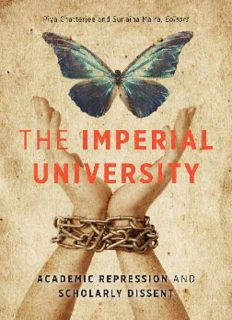
The Imperial University : Academic Repression and Scholarly Dissent PDF
Preview The Imperial University : Academic Repression and Scholarly Dissent
The Imperial University This page intentionally left blank The Imperial University Academic Repression and Scholarly Dissent Piya Chatterjee and Sunaina Maira, Editors University of Minnesota Press Minneapolis London An earlier version of chapter 2, by Roberto J. González, was published in Militarizing Culture: Essays on the Warfare State (Walnut Creek, Calif.: Left Coast Press, 2010). An earlier version of chapter 11, by Jasbir Puar, previously appeared as “Citation and Censor- ship: The Politics of Talking about the Sexual Politics of Israel,” Feminist Legal Studies 13, no. 2. Published online, July 15, 2011. An earlier version of chapter 13, by Vijay Prashad, previously appeared as “Teaching by Candle- light,” Social Text 90, vol. 25, no. 1 (Spring 2007): 105–1 5. Copyright 2014 by the Regents of the University of Minnesota All rights reserved. No part of this publication may be reproduced, stored in a retrieval system, or transmitted, in any form or by any means, electronic, mechanical, photocopying, recording, or otherwise, without the prior written permission of the publisher. Published by the University of Minnesota Press 111 Third Avenue South, Suite 290 Minneapolis, MN 55401- 2520 http://www.upress.umn.edu Library of Congress Cataloging-i n-P ublication Data The Imperial University : academic repression and scholarly dissent / Piya Chatterjee and Sunaina Maira, editors. Includes bibliographical references and index. ISBN 978–0 - 8166– 8089– 4 (hc : alk. paper)— ISBN 978–0 - 8166– 8090– 0 (pb : alk. paper) 1. Education. 2. Public schools—U nited States— Finance. I. Chatterjee, Piya. II. Maira, Sunaina. LB2825.I47 2014 371.010973— dc23 2013038691 Printed in the United States of America on acid-f ree paper The University of Minnesota is an equal-o pportunity educator and employer. 20 19 18 17 16 15 14 10 9 8 7 6 5 4 3 2 1 Dedicated to Sri Rama Prasad Chatterjee— beloved baba, teacher, and friend. With deepest respect and gratitude. And to the Irvine 11, the Davis Dozen, and all those scholars and students who paid the price. This page intentionally left blank Contents Introduction The Imperial University: Race, War, and the Nation- State 1 Piya Chatterjee and Sunaina Maira I. Imperial Cartographies 1. New Empire, Same Old University? Education in the American Tropics after 1898 53 Victor Bascara 2. Militarizing Education: The Intelligence Community’s Spy Camps 79 Roberto J. González 3. Challenging Complicity: The Neoliberal University and the Prison- Industrial Complex 99 Julia C. Oparah II. Academic Containment 4. Neoliberalism, Militarization, and the Price of Dissent: Policing Protest at the University of California 125 Farah Godrej 5. Faculty Governance at the University of Southern California 145 Laura Pulido 6. The Boycott, Divestment, and Sanctions Movement and Violations of Academic Freedom at Wayne State University 169 Thomas Abowd 7. Decolonizing Chicano Studies in the Shadows of the University’s “Heteropatriracial” Order 187 Ana Clarissa Rojas Durazo III. Manifest Knowledges 8. Normatizing State Power: Uncritical Ethical Praxis and Zionism 217 Steven Salaita 9. Nobody Mean More: Black Feminist Pedagogy and Solidarity 237 Alexis Pauline Gumbs 10. Teaching outside Liberal- Imperial Discourse: A Critical Dialogue about Antiracist Feminisms 261 Sylvanna Falcón, Sharmila Lodhia, Molly Talcott, and Dana Collins 11. Citation and Censure: Pinkwashing and the Sexual Politics of Talking about Israel 281 Jasbir Puar IV. Heresies and Freedoms 12. Within and Against the Imperial University: Reflections on Crossing the Line 301 Nicholas De Genova 13. Teaching by Candlelight 329 Vijay Prashad 14. UCOP versus R. Dominguez: The FBI Interview. A One-A ct Play à la Jean Genet 343 Ricardo Dominguez Acknowledgments 355 Contributors 357 Index 361 Introduction The Imperial University Race, War, and the Nation- State Piya Chatterjee and Sunaina Maira Storm Troopers and Students Piya: January 19, 2012. It is midafternoon on a brisk and beautiful winter day in the Inland Empire of Southern California. I enter my second floor office in the Department of Women’s Studies at the University of California, Riverside. The hallway is silent. It reminds me, sadly, of any colorless and functional corporate office building. I wish for sound, some sign of collective social life. This alienating silence is particularly acute today given the noisy scenes of protest (including some Rabelaisian revelries with drumming and chants) taking place just a few hundred feet away in the student commons. The Board of Regents of the University of California (UC) is meeting on campus to address the budget crisis that has, for some years now, imper- iled this great public university system and led to severe tuition hikes. Stu- dents know that their fees will be raised again. Contingent faculty and other workers know they will be plunged into further precarity. For some years now, the alliances forged among student, faculty, and labor unions in response to the public education crisis have meant that any high-l evel UC administrators’ gathering is met with well- planned protests and resistance. But it also means that police officers and other law enforcement agents are in full gear and out in full force. Earlier in the day, I join other protestors who throng the site of the meet- ing and whose mood is quite upbeat. “Whose university?” someone chants. “Our university!” replies the crowd. Plainclothes men mingle with protesters, lots of cameras are out. A friend, familiar with surveillance techniques, nudges me: “No need to get paranoid,” she says, “but you do realize we are all being photographed?” A police officer repeatedly asks us to clear the commons. “Our university!” chants the crowd in response. In that micromoment of regula- tion around who should people “the commons,” I sense that a fence is being 1
Description: